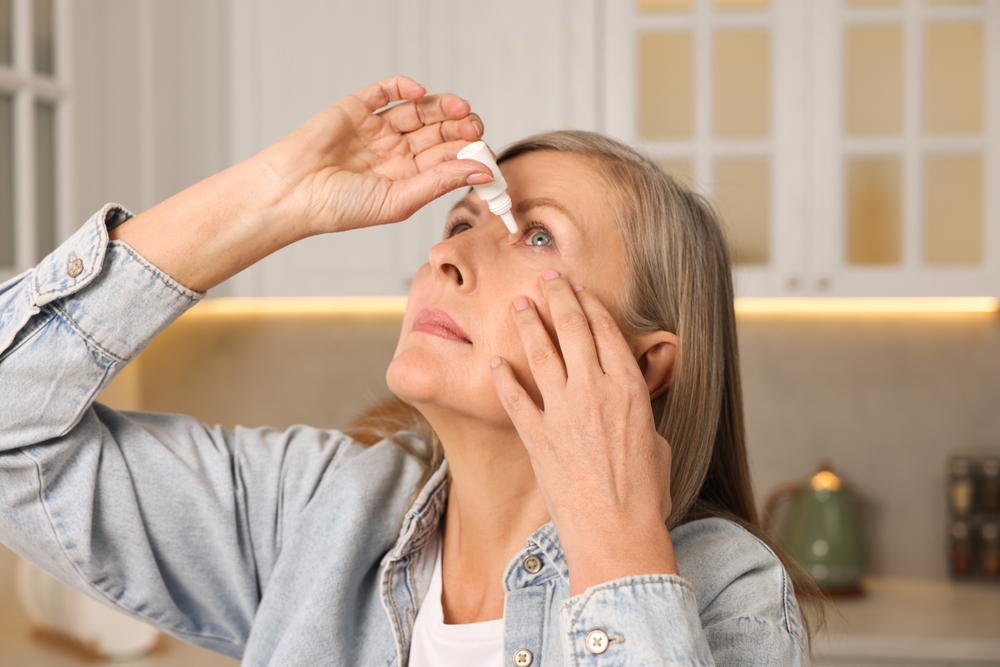Do I Have to Use Eye Drops Forever to Control Glaucoma?
September 10, 2024
If you have been diagnosed with glaucoma and been prescribed eye drops, one question you may have for your eye doctor is how long you need to use them to control glaucoma. To understand the likely answer to that question, it can be helpful to learn more about glaucoma, how eye drops control glaucoma, and what other glaucoma treatments might be available to you.
What is Glaucoma?
 Glaucoma is a group of eye diseases that occur when high levels of intraocular pressure damage the optic nerve. It is one of the leading causes of preventable blindness in older Americans.
Glaucoma is a group of eye diseases that occur when high levels of intraocular pressure damage the optic nerve. It is one of the leading causes of preventable blindness in older Americans.
The two most common types of glaucoma are open-angle glaucoma and closed-angle glaucoma. These two types account for the vast majority of all glaucoma diagnoses in the US.
Open-Angle Glaucoma
Open-angle glaucoma occurs when the drainage angles in the eye are not able to properly drain fluid from the eye. As fluid builds up and intraocular pressure increases, it damages the optic nerve, the structure within the eye responsible for transmitting visual information to the brain.
Open-angle glaucoma develops slowly and without symptoms, so it is often called "the silent thief of sight." The damage caused to the optic nerve by glaucoma impairs vision so slowly that many people are not aware they have it until significant damage has occurred.
Angle-Closure Glaucoma
Angle-closure glaucoma occurs when the drainage angle of the eye becomes blocked, leading to a sudden increase in intraocular pressure. The symptoms of angle-closure glaucoma usually come on suddenly and are more severe than those of open-angle glaucoma.
If you experience symptoms of angle-closure glaucoma, it is essential to seek care immediately to avoid permanent vision loss.
There is no cure for glaucoma and there is no way to reverse damage to the optic nerve. The goal of all glaucoma treatment is to prevent glaucoma from worsening and protect against further vision impairment.
Typically, the first method of treatment is prescription eye drops to help lower eye pressure.
How Do Eye Drops Treat Glaucoma?
 Eye drops help treat glaucoma by lowering intraocular pressure. The eye drops prescribed for glaucoma work in different ways to do this.
Eye drops help treat glaucoma by lowering intraocular pressure. The eye drops prescribed for glaucoma work in different ways to do this.
Reducing Fluid Production
Some eye drops decrease the production of aqueous humor. By reducing the amount of fluid produced, this type of eye drop lowers pressure within the eye.
These eye drops contain active ingredients like beta blockers, which decrease fluid production, and carbonic anhydrase inhibitors, which inhibit the enzyme responsible for fluid production.
Increasing Fluid Outflow
Other eye drops increase the drainage of aqueous humor, allowing it to leave the eye more efficiently and reducing intraocular pressure.
Examples of these eye drops include prostaglandin analogs and rho kinase inhibitors, both of which improve drainage by increasing fluid outflow through the eye's trabecular meshwork.
Both Reducing Production and Increasing Outflow
Another type of eye drop both reduces aqueous humor production and increases its outflow. This type of eye drop, called alpha agonists, offers a more comprehensive approach to controlling glaucoma.
How Long Do You Have to Use Eye Drops to Control Glaucoma?
Because there is no cure for glaucoma or any way to reverse the damage done to the optic nerve by glaucoma, many people with this eye condition will need to use eye drops long-term to control intraocular pressure. The length of eye drop treatment for glaucoma often depends on the specifics of the individual diagnosis, including the type and severity of glaucoma, how well eye drops control intraocular pressure, and how the eyes respond to other treatments.
If eye drops stop effectively controlling intraocular pressure, an eye doctor may suggest another type of glaucoma treatment.
What are Other Treatments for Glaucoma?
If eye drops are not controlling your glaucoma, other treatments are available. These treatments include laser procedures, trabeculectomy, and minimally invasive glaucoma surgery (MIGS).
Laser Procedures
At Maryland Vision Institute, we offer the most advanced laser procedures for controlling glaucoma. These procedures include laser trabeculoplasty and iridotomy/ iridoplasty.
Laser trabeculoplasty is used to treat open-angle glaucoma. During this procedure, laser light is focused on the eye's trabecular meshwork to increase fluid drainage.
Iridotomy/ iridoplasty is a laser procedure used to treat angle-closure glaucoma. It involves using a laser to create a tiny hole in the eye's iris, increasing the flow of fluid from the front of the eye and releasing pressure on the iris.
Trabeculectomy
Trabeculectomy is an incisional glaucoma surgery that involves creating a new drainage channel to increase fluid drainage and relieve intraocular pressure. It is similar to a laser trabeculoplasty, but in this procedure, a traditional scalpel is used instead of a laser.
Having a trabeculectomy can reduce or even eliminate the need for eye drops post-surgery.
MIGS
Minimally invasive glaucoma surgery is one of the latest advances in glaucoma treatment. It is most effective at treating glaucoma in its early stages.
There are several different MIGS procedures. MIGS can be used to implant a stent, a very tiny ocular device that drains fluid, remove trabecular meshwork to improve fluid drainage and perform a canaloplasty, which can clear and improve fluid outflow pathways.
MIGS can offer patients with mild-to-moderate open-angle glaucoma treatment options that are less invasive and pose a lower risk for complications. They typically have much shorter recovery times than other glaucoma surgeries.
While it's likely that you will always need to use eye drops to control your glaucoma, it's important to remember that eye drops are essential for protecting and preserving the quality of your vision. If not controlled by eye drops or other treatments, glaucoma could be the "silent thief" of your eyesight.
Do you want to learn more about eye drops for glaucoma? Schedule an appointment at Maryland Vision Institute in Hagerstown, Frederick, or Hancock, MD, today!



